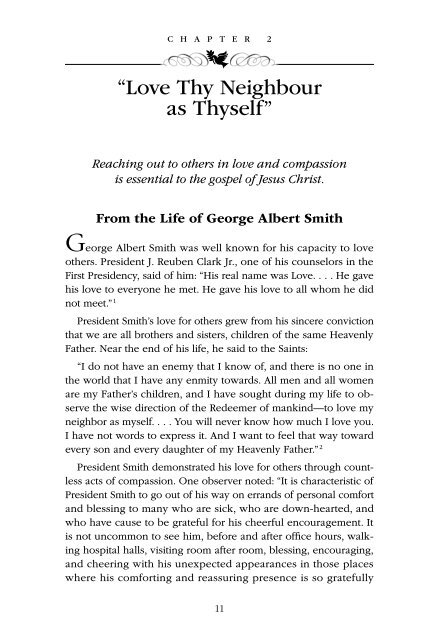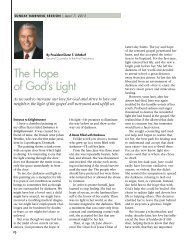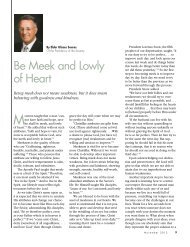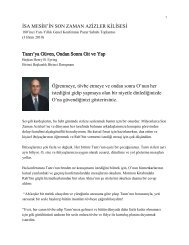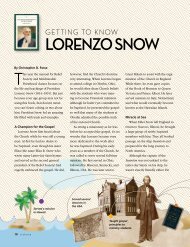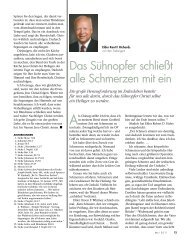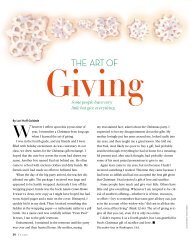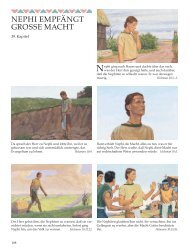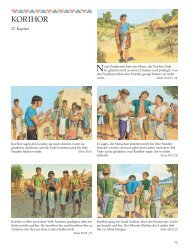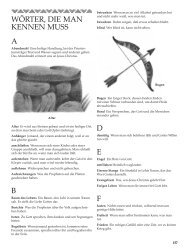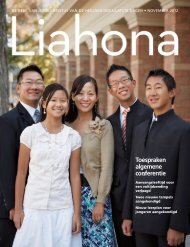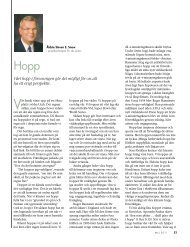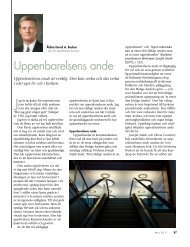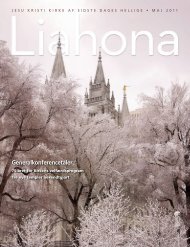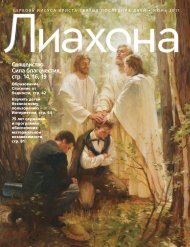george albert smith - The Church of Jesus Christ of Latter-day Saints
george albert smith - The Church of Jesus Christ of Latter-day Saints
george albert smith - The Church of Jesus Christ of Latter-day Saints
Create successful ePaper yourself
Turn your PDF publications into a flip-book with our unique Google optimized e-Paper software.
C H A P T E R 2<br />
“Love Thy Neighbour<br />
as Thyself”<br />
Reaching out to others in love and compassion<br />
is essential to the gospel <strong>of</strong> <strong>Jesus</strong> <strong>Christ</strong>.<br />
From the Life <strong>of</strong> George Albert Smith<br />
George Albert Smith was well known for his capacity to love<br />
others. President J. Reuben Clark Jr., one <strong>of</strong> his counselors in the<br />
First Presidency, said <strong>of</strong> him: “His real name was Love. . . . He gave<br />
his love to everyone he met. He gave his love to all whom he did<br />
not meet.” 1<br />
President Smith’s love for others grew from his sincere conviction<br />
that we are all brothers and sisters, children <strong>of</strong> the same Heavenly<br />
Father. Near the end <strong>of</strong> his life, he said to the <strong>Saints</strong>:<br />
“I do not have an enemy that I know <strong>of</strong>, and there is no one in<br />
the world that I have any enmity towards. All men and all women<br />
are my Father’s children, and I have sought during my life to observe<br />
the wise direction <strong>of</strong> the Redeemer <strong>of</strong> mankind—to love my<br />
neighbor as myself. . . . You will never know how much I love you.<br />
I have not words to express it. And I want to feel that way toward<br />
every son and every daughter <strong>of</strong> my Heavenly Father.” 2<br />
President Smith demonstrated his love for others through countless<br />
acts <strong>of</strong> compassion. One observer noted: “It is characteristic <strong>of</strong><br />
President Smith to go out <strong>of</strong> his way on errands <strong>of</strong> personal comfort<br />
and blessing to many who are sick, who are down-hearted, and<br />
who have cause to be grateful for his cheerful encouragement. It<br />
is not uncommon to see him, before and after <strong>of</strong>fice hours, walking<br />
hospital halls, visiting room after room, blessing, encouraging,<br />
and cheering with his unexpected appearances in those places<br />
where his comforting and reassuring presence is so gratefully<br />
11
cHaPTer 2<br />
“<strong>The</strong> gospel teaches us to have charity for all and to love our fellows.”<br />
12
13<br />
cHaPTer 2<br />
welcome. . . . It is characteristic <strong>of</strong> him to go wherever he feels that<br />
he can give help and encouragement.” 3<br />
President Thomas S. Monson shared a specific example <strong>of</strong><br />
President Smith going out <strong>of</strong> his way to show love for someone in<br />
need:<br />
“On a cold winter morning, the street cleaning crew [in Salt Lake<br />
City] was removing large chunks <strong>of</strong> ice from the street gutters. <strong>The</strong><br />
regular crew was assisted by temporary laborers who desperately<br />
needed the work. One such wore only a lightweight sweater and<br />
was suffering from the cold. A slender man with a well-groomed<br />
beard stopped by the crew and asked the worker, ‘You need more<br />
than that sweater on a morning like this. Where is your coat?’ <strong>The</strong><br />
man replied that he had no coat to wear. <strong>The</strong> visitor then removed<br />
his own overcoat, handed it to the man and said, ‘This coat is yours.<br />
It is heavy wool and will keep you warm. I just work across the<br />
street.’ <strong>The</strong> street was South Temple. <strong>The</strong> good Samaritan who<br />
walked into the <strong>Church</strong> Administration Building to his daily work<br />
and without his coat was President George Albert Smith <strong>of</strong> <strong>The</strong><br />
<strong>Church</strong> <strong>of</strong> <strong>Jesus</strong> <strong>Christ</strong> <strong>of</strong> <strong>Latter</strong>-<strong>day</strong> <strong>Saints</strong>. His selfless act <strong>of</strong> generosity<br />
revealed his tender heart. Surely he was his brother’s keeper.” 4<br />
[See suggestion 1 on page 18.]<br />
Teachings <strong>of</strong> George Albert Smith<br />
All people are our brothers and sisters,<br />
children <strong>of</strong> our Heavenly Father.<br />
We look upon all men as our brothers, all women as our sisters;<br />
we look upon the face <strong>of</strong> every human being that is in the world as<br />
a child <strong>of</strong> our Father, and believe that as each is in the image <strong>of</strong> the<br />
Father, so also each possesses a spark <strong>of</strong> divinity that if developed<br />
will prepare us to return to His presence. . . .<br />
That is our understanding <strong>of</strong> the purpose <strong>of</strong> our existence in the<br />
world, and explains our interest in our fellowmen. Many have supposed<br />
that we were exclusive in our lives, and some have thought<br />
that we were clannish. <strong>The</strong> fact is, we look upon every child that<br />
is born into the world, as a son or daughter <strong>of</strong> God, as our brother<br />
or our sister, and we feel that our happiness will not be complete
cHaPTer 2<br />
in the kingdom <strong>of</strong> heaven unless we enjoy the companionship <strong>of</strong><br />
our families and those <strong>of</strong> our friends and associates with whom we<br />
have become acquainted and in whose interest we give so much<br />
<strong>of</strong> our time on earth. 5<br />
As I think <strong>of</strong> my regard and my affection for my Father’s family,<br />
the human family, I remember something my earthly father said, and<br />
I think probably I inherited that in part from him. He said, “I have<br />
never seen a child <strong>of</strong> God so deep in the gutter that I have not had<br />
the impulse to stoop down and lift him up and put him on his feet<br />
and start him again.” I would like to say I have never seen one <strong>of</strong><br />
my Father’s children in my life that I have not realized he was my<br />
brother and that God loves every one <strong>of</strong> his children. 6<br />
What a happy world it would be if men everywhere recognized<br />
their fellowmen as brothers and sisters, and then followed that<br />
up by loving their neighbors as themselves. 7 [See suggestion 2 on<br />
page 18.]<br />
<strong>The</strong> gospel <strong>of</strong> <strong>Jesus</strong> <strong>Christ</strong> teaches us<br />
to love all <strong>of</strong> God’s children.<br />
<strong>The</strong> gospel teaches us to have charity for all and to love our fellows.<br />
<strong>The</strong> Savior said:<br />
“Thou shalt love the Lord thy God with all thy heart, and<br />
with all thy soul, and with all thy mind, this is the first and great<br />
commandment.<br />
“And the second is like unto it, Thou shalt love thy neighbor<br />
as thyself. On these two commandments hang all the law and the<br />
prophets.” [Matthew 22:37–40.]<br />
Brethren and sisters, if the gospel <strong>of</strong> <strong>Jesus</strong> <strong>Christ</strong>, as delivered<br />
to you, has not planted that feeling <strong>of</strong> love in your hearts for your<br />
fellow men, then I want to say that you have not enjoyed the full<br />
fruition <strong>of</strong> that wonderful gift that came to earth when this <strong>Church</strong><br />
was organized. 8 [See suggestion 3 on page 19.]<br />
Our ministry is one <strong>of</strong> love. Our service is one which enriches<br />
our lives. . . . If we are living as God intends that we should live,<br />
14
“Let us evidence by our conduct . . . that we do keep that great<br />
commandment . . . , ‘Thou shalt love thy neighbor as thyself.’”<br />
15<br />
cHaPTer 2<br />
if we are ministering as he desires that we should minister, every<br />
<strong>day</strong> <strong>of</strong> our lives is enriched by the influence <strong>of</strong> his Spirit, our love<br />
<strong>of</strong> our fellowmen increases and our souls are enlarged until we feel<br />
that we could take into our arms all <strong>of</strong> God’s children, with a desire<br />
to bless them and bring them to an understanding <strong>of</strong> the truth. 9<br />
As members <strong>of</strong> the <strong>Church</strong> <strong>of</strong> <strong>Christ</strong>, we should keep His commandments<br />
and love one another. <strong>The</strong>n our love should pass beyond<br />
the border lines <strong>of</strong> the <strong>Church</strong> with which we are identified,<br />
and reach out after the children <strong>of</strong> men. 10<br />
Let us evidence by our conduct, by our gentleness, by our love,<br />
by our faith, that we do keep that great commandment that the<br />
Savior said was like unto the first great commandment, “Thou shalt<br />
love thy neighbor as thyself.” 11
cHaPTer 2<br />
We exercise charity by reaching out to those<br />
who need help and encouragement.<br />
<strong>The</strong> measurement <strong>of</strong> the result <strong>of</strong> what love and charity may<br />
bring into the world is impossible. Opportunity is <strong>of</strong>fered in every<br />
branch and ward and mission field to go about radiating sunshine,<br />
developing happiness and lifting up those who are discouraged,<br />
and bringing joy and comfort to those who are in distress. 12<br />
<strong>The</strong> Lord says this:<br />
“See that ye love one another; cease to be covetous; learn to<br />
impart one to another as the gospel requires. . . .<br />
“And above all things, clothe yourselves with the bond <strong>of</strong> charity,<br />
as with a mantle, which is the bond <strong>of</strong> perfectness and peace.”<br />
[D&C 88:123, 125.] . . .<br />
. . . Are you following his advice with reference to charity? I want<br />
to say that at this particular period <strong>of</strong> our lives we need to exercise<br />
charity, not only in imparting <strong>of</strong> our substance to those who are in<br />
need, but we need to have charity for the weaknesses and failures<br />
and mistakes <strong>of</strong> our Father’s children. 13<br />
If we find a man or a woman who has not succeeded in life,<br />
one who is weakening in his faith, let us not turn our backs upon<br />
him; let us make it a point to visit him, and go to him in kindness<br />
and love, and encourage him to turn from the error <strong>of</strong> his way. <strong>The</strong><br />
opportunity to do individual work among us as a people is present<br />
everywhere; and there are few men and few women in this <strong>Church</strong><br />
who could not, if they would, reach out a little farther from the<br />
circle with which they are identified, and say a kind word, or teach<br />
the truth to some <strong>of</strong> our Father’s children. . . . This is our Father’s<br />
work. It is the most important thing that we will be identified with<br />
in this life. 14<br />
I have only good will in my heart for mankind. I haven’t any animosity<br />
in my heart toward any living human being. I know some<br />
that I wish would behave themselves a little better than they do,<br />
but that is their loss, not mine. If I can get my arm around them and<br />
help them back on the highway <strong>of</strong> happiness by teaching them the<br />
gospel <strong>of</strong> <strong>Jesus</strong> <strong>Christ</strong>, my happiness will be increased thereby. . . .<br />
16
17<br />
cHaPTer 2<br />
“Go about radiating sunshine, developing happiness and lifting up those who<br />
are discouraged, and bringing joy and comfort to those who are in distress.”<br />
You cannot drive people to do things which are right, but you can<br />
love them into doing them, if your example is <strong>of</strong> such a character<br />
that they can see you mean what you say. 15 [See suggestion 4 on<br />
page 19.]<br />
True happiness comes from loving and serving others.<br />
Do not forget no matter how much you may give in money, no<br />
matter how you may desire the things <strong>of</strong> this world to make yourselves<br />
happy, your happiness will be in proportion to your charity<br />
and to your kindness and to your love <strong>of</strong> those with whom you<br />
associate here on earth. Our Heavenly Father has said in very plain<br />
terms that he who says he loves God and does not love his brother<br />
is not truthful [see 1 John 4:20]. 16<br />
It isn’t only what we receive that makes us happy; it is what we<br />
give, and the more we give <strong>of</strong> that which is uplifting and enriching
cHaPTer 2<br />
to our Father’s children, the more we have to give. It grows like a<br />
great fountain <strong>of</strong> life and bubbles up to eternal happiness. 17<br />
When our life here is ended and we return home, we will find<br />
credited to us there every good act we have performed, every kindness<br />
we have done, every effort we have put forth to benefit our<br />
fellows. . . .<br />
. . . Let us evidence our appreciation <strong>of</strong> what the Lord has given<br />
us by serving Him, and we are serving Him when we do good to<br />
His children. Freely we have received, now freely give [see Matthew<br />
10:8]. With hearts warmed with love and kindness for our fellow<br />
men, let us press steadily on until the final summons shall come,<br />
and we shall meet our record. <strong>The</strong>n, if we have improved our talents,<br />
if we have been honest, true, chaste, benevolent, and charitable,<br />
and have sought to uplift every soul with whom we have<br />
associated, if we have lived up to the light we have received, and<br />
disseminated that light whenever opportunity has presented, how<br />
happy we will be and how our hearts will swell with gratitude<br />
when we receive from the Maker <strong>of</strong> heaven and earth that welcome<br />
plaudit: “Well done, good and faithful servant; thou hast been faithful<br />
over a few things; I will make thee ruler over many things; enter<br />
thou into the joy <strong>of</strong> thy Lord.” [Matthew 25:21.] 18 [See suggestion 5<br />
on page 19.]<br />
Suggestions for Study and Teaching<br />
Consider these ideas as you study the chapter or as you prepare to<br />
teach. For additional help, see pages v–vii.<br />
1. Consider ways you can demonstrate love President Smith as<br />
did (see pages 11–13). For example, how can we demonstrate<br />
love in fulfilling our home and visiting teaching assignments?<br />
2. As you study the first section <strong>of</strong> teachings (pages 13–14), think<br />
about how applying these teachings might improve your relationship<br />
with your neighbors, co-workers, family members, and<br />
others.<br />
18
19<br />
cHaPTer 2<br />
3. Read the last full paragraph on page 14. What are some teachings<br />
or stories in the scriptures that inspire you to love and<br />
serve others?<br />
4. Study the section that begins on page 16, particularly the last<br />
two paragraphs. Think <strong>of</strong> someone who may be outside “the<br />
circle with which [you] are identified.” What is something specific<br />
you can do to reach out to such a person?<br />
5. Ponder President Smith’s teachings on pages 17–18. What experiences<br />
have you had that have taught you that true happiness<br />
comes from making others happy?<br />
Related Scriptures: Matthew 5:43–44; 25:34–40; Luke 10:25–37; John<br />
13:34–35; 1 John 4:7–8; 1 Nephi 11:16–25; Moroni 7:44–48<br />
Teaching help: “Quite a bit <strong>of</strong> teaching that is done in the <strong>Church</strong><br />
is done so rigidly, it’s lecture. We don’t respond to lectures too well<br />
in classrooms. We do in sacrament meeting and at conferences, but<br />
teaching can be two-way so that you can ask questions. You can<br />
sponsor questions easily in a class” (Boyd K. Packer, “Principles <strong>of</strong><br />
Teaching and Learning,” Ensign, June 2007, 87).<br />
Notes<br />
1. J. Reuben Clark Jr., “No Man Had<br />
Greater Love for Humanity Than He,”<br />
Deseret News, Apr. 11, 1951, <strong>Church</strong><br />
section, 10, 12.<br />
2. “After Eighty Years,” Improvement Era,<br />
Apr. 1950, 263.<br />
3. Richard L. Evans, “Anniversary,”<br />
Improvement Era, Apr. 1946, 224.<br />
4. In Conference Report, Apr. 1990, 62;<br />
or Ensign, May 1990, 47.<br />
5. “Mormon View <strong>of</strong> Life’s Mission,”<br />
Deseret Evening News, June 27, 1908,<br />
<strong>Church</strong> section, 2.<br />
6. “Pres. Smith’s Leadership Address,”<br />
Deseret News, Feb. 16, 1946, 6.<br />
7. In Conference Report, Oct. 1946, 149.<br />
8. In Conference Report, Apr. 1922, 52.<br />
9. In Conference Report, Oct. 1929, 24.<br />
10. In Conference Report, Apr. 1905, 62.<br />
11. In Conference Report, Apr. 1949, 10.<br />
12. “To the Relief Society,” Relief Society<br />
Magazine, Dec. 1932, 704.<br />
13. “<strong>Saints</strong> Blessed,” Deseret News, Nov. 12,<br />
1932, <strong>Church</strong> section, 5, 8.<br />
14. In Conference Report, Apr. 1914, 12–13.<br />
15. In Conference Report, Apr. 1946,<br />
184–85.<br />
16. “To the Relief Society,” 709.<br />
17. Sharing the Gospel with Others, sel.<br />
Preston Nibley (1948), 214; address<br />
given Nov. 4, 1945, in Washington, D.C.<br />
18. “Mormon View <strong>of</strong> Life’s Mission,” 2.
“I know that my redeemer lives and gladly yield my humble efforts<br />
to establish His teachings.”<br />
20


